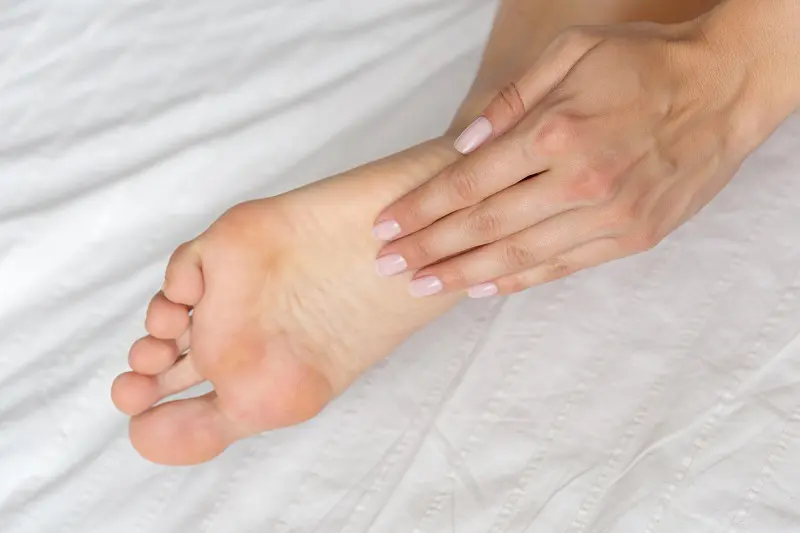Not only is it confusing to spell, but plantar fasciitis can be difficult to understand. We’ve compiled some of the most frequently asked questions about plantar fasciitis and answered them for you here.
Q: What is plantar fasciitis?
A: Plantar fasciitis is an aggravation of the plantar fascia (a type of soft tissue on bottom of the foot) where it meets up with the heel. It causes intense pain.
Q: Who typically gets plantar fasciitis?
A: Runners (specifically long-distance runners) and individuals who are overweight tend to be the ones who get plantar fasciitis most often.
Q: What is the plantar fascia?
A: The plantar fascia is a ligament that runs along the bottom (or arch) of your foot. It connects the base of the toes with the heel, which is where plantar fasciitis pain originates.
Q: What are the symptoms of plantar fasciitis?
A: A sharp, stabbing pain at the bottom of your foot near the heel is the main indicator of plantar fasciitis.
Q: When does the plantar fasciitis pain flare up?
A: The pain near the heel is usually most painful during the first steps you take in the morning, if you’ve been on your feet for an extended period of time, or the first steps you take after a long period of sitting.
Q: What are the risk factors for plantar fasciitis?
A: You increase your risk of plantar fasciitis if you fall into any of these categories:
- Runner (specifically longer distance)
- Working on your feet
- Overweight
- Flat feet
- High arches
- Between ages 40 and 60
Q: What can I do for the plantar fasciitis pain?
A: You can try a few at-home plantar fasciitis treatments to relieve your pain:
- Ice your arch
- Rest
- Use arch supports
- Stretch
- Replace footwear
- Over-the-counter pain medication
Q: Should I stretch my foot with plantar fasciitis?
A: Yes! Stretching can help alleviate pain, promote healing, and even reduce your chance of developing plantar fasciitis in the first place. Routinely stretch your feet and your calf muscles (whether you have plantar fasciitis or not!).
Q: What can a podiatrist do for my plantar fasciitis?
A: If your plantar fasciitis pain becomes unbearable, you will want to visit a podiatrist. The podiatrist may suggest one of these interventions for your feet:
- Night splints. These are braces you wear overnight. They keep your foot in a flexed position.
- Custom orthotics. These are arch supports that are made specifically for your feet.
- Boot. A boot can help protect your foot while it heals while still allowing you to walk around on it.
Q: What surgical options are available for plantar fasciitis that just won’t go away?
A: Two surgical procedures might be considered by your podiatrist if your plantar fasciitis pain is persistent:
- Plantar fascia release: Your podiatrist might want to release the tension in your plantar fascia. The podiatrist does this by removing the plantar fascia from the heel bone or by making a lot of small incisions in the ligament itself. This plantar fasciitis surgery can reduce the function of your foot, and it weakens the arches so it is not a good choice if other options can help relieve the pain.
- Gastrocnemius reduction: This procedure increases foot flexibility and ankle motion by lengthening the calf muscle.
Q: What complications could arise from ignoring my plantar fasciitis?
A: If you don’t treat your plantar fasciitis, you will have chronic heel pain. This can not only be a nuisance, but it can also affect the rest of your body. You will most likely compensate for this pain with how you walk, trying to aggravate it as little as possible. By doing this, you will hurt your ankles, knees, and hips. It could lead to major problems down the road.
Q: How long will I have plantar fasciitis pain?
A: Plantar fasciitis can take a few months to a year to completely clear up.
Q: How can I prevent plantar fasciitis in the future?
A: Some lifestyle changes can help you prevent developing plantar fasciitis in the future:
- Change your footwear regularly. Worn-out shoes don’t provide the support you need.
- Incorporate low-impact workouts into your routine. If you only run, you will injure yourself. Add swimming or bicycling into the mix.
- Maintain a healthy weight. If you are overweight, you put extra stress on your body. If you reach a healthy weight, you will put less unnecessary strain on your plantar fascia.
- Stretch daily.
If any of your plantar fasciitis questions weren’t answered here, reach out. We would love to talk about foot pain with you.

